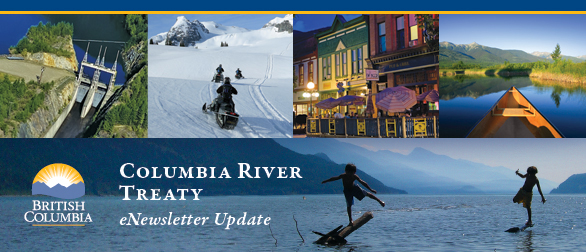Columbia River Treaty
Edition:

Sounding Board Meetings Held June 3 and July 5
The twenty-eight members of the Sounding Board form a geographically balanced representation of Columbia Basin residents with knowledge of dam/reservoir planning and operations and/or recognized in their communities as knowledgeable in one or more key areas of interest identified by Basin residents during the Columbia River Treaty Review process, and who are able to provide a broad perspective and contribute positively to discussions on Treaty-related matters. The Sounding Board also includes youth representatives. More information about the Sounding Board can be found here.
The first face to face Sounding Board meeting took place in Nakusp on June 3, 2013, with twenty-four members in attendance. The Treaty Review team laid out the strategic decision – to continue or to terminate the Columbia River Treaty – along with the main implications of the future Treaty scenarios. Sounding Board members asked questions about the possible implications, the timing of the decision, how it would be made, and how Basin residents’ input would be considered.
The Sounding Board reviewed nearly 100 interests/issues that had been collected by the Treaty Review Team during their public consultations to determine whether or not the interest/issue was directly, indirectly or not affected by the strategic decision. In the end, Sounding Board members concluded that just a fraction of the interests/issues were directly impacted by the strategic decision and most of the interests/issues could be addressed without involving the U.S. or the Treaty.
Sounding Board members also reviewed the results of the Columbia River Treaty Review technical studies. The technical studies show the range of physically possible operations under the two key scenarios and focus on “bookend” alternatives and not the possible alternatives in between. Sounding Board members questioned whether the bookends showed the full range of what was physically possible. Sounding Board members also asked questions about the performance measures used in the studies and talked about how other values/interests could be represented by the performance measures.
Sounding Board members received information about Columbia-Kootenay River operations with and without the Treaty and how changes in one reservoir might impact the rest of the system. Armed with more information and a greater understanding, Sounding Board members requested another meeting to continue the discussion.
The second Sounding Board meeting was held on July 5, 2013 in Cranbrook with twenty-two members attending. After quickly reviewing highlights from the June 3, 2013 meeting in Nakusp, Sounding Board members heard about the key points of the Province’s discussion paper entitled U.S. Benefits from the Columbia River Treaty – Past, Present and Future: A Province of British Columbia Perspective and about the U.S. working draft of recommendations on the Columbia River Treaty Review [link: http://www.crt2014-2024review.gov/RegionalDraft.aspx]. Alan Thomson of Mountain Station Consultants provided a presentation that expanded the bookend alternatives discussed at the June 3, 2013 meeting and considered three options for Duncan Dam (status quo, decommissioning, and installing power generation), decommissioning of Hugh L. Keenleyside Dam and Arrow Lakes Generating Station, and issues and benefits of an Arrow Lakes Reservoir mid pool constant elevation scenario.
Sounding Board members discussed the implications of the options in Mr. Thomson’s presentation and their potential impact on Kootenay Lake and Kinbasket Reservoir.
They also discussed whether the preferred outcomes of Basin residents were more likely to come about if the Treaty were terminated or, if the Treaty continued, these interests could be negotiated and result in an improved Treaty. Some members thought terminating the Treaty would result in the best outcome for ecosystems while not increasing impacts on Kinbasket Reservoir while other members, particularly those from around Koocanusa Reservoir, were concerned about potential impacts to Koocanusa Reservoir and to the Kootenay River system if the Treaty were terminated.
All in attendance were reminded that changes could be made under the Treaty providing both countries agreed. Sounding Board members felt consideration should be given to continuing the Treaty and negotiating for B.C. benefits, while keeping open the option to terminate the Treaty if no progress can be made. Later, working in smaller groups, Sounding Board members identified and prioritized key elements of Basin interests they felt should inform the recommendation to Cabinet and negotiations for an improved Treaty. A teleconference will be held in early fall to determine Sounding Board next steps.
The June 3, 2013 and July 5, 2013 meeting agenda and presentation material is available on the Province’s website [link to: http://blog.gov.bc.ca/columbiarivertreaty/sounding-board/]. Summary reports of the meetings will be available soon.





















